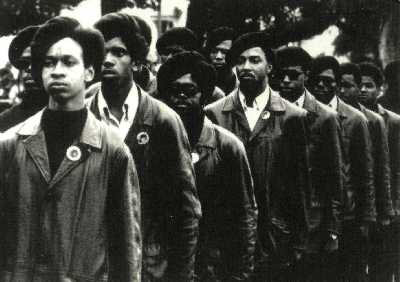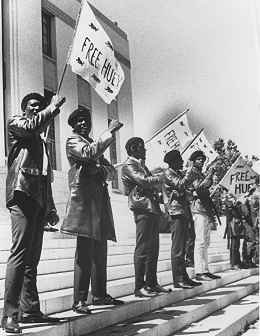
The Black Panthers

The Black Panthers
The Black Panther Party For Self-Defense was formed in 1966 by Huey P Newton and Bobby Seale disenchanted by the fact that most self proclaimed revolutionary groups simply spent most of their time theorizing rather than putting ideas into practice. The party first came to prominence with their armed Police Patrols, which were established in order to ensure that the racist pigs were not harassing the people within their communities and therefore raise the consciousness of the people. This for many people is the image that springs to mind whenever the Panthers are mentioned, but their legacy stretches further than that to the point where their Breakfast For Children Program is part of the fabric of US School System and the Party's Sickle Cell Anaemia Research Foundation inspired the federal government's initial funding of sickle cell research
As part of Black History Month, Designer Magazine spoke to David Hilliard and Fredrika Newton who formed the Huey P Newton Foundation in 1993, an organization which aims to provide an accurate history of the Black Panthers. David Hilliard is the former Black Panther Party Chief Of Staff, while Fredrika Newton joined the party as a youth member in 1969, married Huey in 1981 and remained with him till his death in 1989. What this interview tries to do is provide an introduction to the Panthers and shows is that their legacy is more relevant than ever in today's society and this generation.
Q: If we could start by telling our readers what the
Huey P Newton Foundation does on a daily basis and how this is related
back to the original Black Panther Party?
Fredrika: We are actually an information based
foundation. We continue to provide the accurate history of the Black Panther
Party through archives and our web site. We do bus tours which show 18
historical sites that were very important in the history of the Black Panthers...so
we take people on tours to the actual sites of the first Breakfast for
Children Program, the site of where the Black Panthers started, Bobby
Seale's home, Huey Newton's home and sites like that which were very important
to the party.
We also have a speaking bureau where we go out and try
and keep the history pure and try and provide that to the public. We've
been instrumental in publishing the book by Huey Newton and David Hilliard
and have self published a pictorial essay on the history of the Black Panther
Party.
Q: When I was at school the issue of slavery was brushed
over in one lesson and the Black Panthers were not even mentioned. Obviously
there are differences between the UK and the US, but I guess the history
of the Black Panthers is something that isn't told is regular education?
Fredrika: Not at all, so we've tried to incorporate
that history in the text of California History Books. It's been an uphill
battle because we do this on our own and we aren't funded by grant sources.
We haven't been embraced by the city, but this is still our life work.
The history lessons that you got in the UK were not much different from
the history lessons the children get here which is quite disturbing. This
is what we attempt to address with the foundation.
Q: I think one of the main misconceptions people have
about the Black Panthers is that they were anti-white as opposed to against
the actual racists people in authority who blatantly discriminated. For
those people who don't know a great deal about the Panthers and only have
heard stories passed down from previous generations could you state clearly
the Panthers point of view on the subject?
Fredrika: If you have access to the history you
would see that we worked in coalition with Brown people, Asian people,
White people and it was not a racist organization at all. We were one of
the only organizations that came out in support of gays, if not the only.
So if you have access to the history then you know that, but people haven't
because they're not being taught about the Panthers in schools.
David: No doubt that in the formative stages of
our Black Panther Party there were a lot of difficulties especially in
the area of working with the Gay Rights movement because nobody else from
the Civil Rights movement would touch those issues. We were the first to
embrace a working relationship with the Gay Rights Movement, Lesbian and
Women's Rights Movement - the Panthers were pioneers in doing this in 1969
and 1970. The Panthers were always in the Vanguard and forging new directions
and setting the standard. That is the model. That's what Panthers represent.
We were a Vanguard Movement. A Revolutionary Movement.
Q: When you actually read the writing of Huey Newton
and the ideas behind the Panthers you can actually see how they relate
to the Anti-War movement in today's society. Would you agree?
David: If you look at the Anti-War movement. We
were the first from the Left and the African American community that totally
embraces the Anti Vietnam War. I was one of the Chief Spokespersons and
Representatives in the largest demonstrations in California thus far. 250,000
par in 1969 to oppose the War in Vietnam.
We were a global movement and had an International Section in Algeria and we were working with them in collaboration with all the liberation movements in the world. The issues of raising your profile with the police, the issues of prison, the issues of Gay and Women Rights. All those issues the Black Panther Party were at the spearhead of and at the forefront of and a lot of those issues are right back here now in the Anti-War movement. I think you had 400,000 people in London recently opposing the war direct and a lot of this stuff is coming back to haunt America.
This generation can gain a lot of important messages by
looking at our Black Panther Party and hopefully that's is what they'll
get out of this interview.
Q: Huey's theory on Intercommunalism is so relevant
to today especially when you look at George W Bush and the American Military
putting Joint Vision 2020 into place as we speak.
David: No doubt. Huey's vision was absolutely
amazing that this man over 20 years ago prophesied exactly what is happening
now with America being the Empire who is trying to assert control and have
a strong hold on all of the world resources. After all this what this is
about...they've become the policemen of the world...and that is what Huey
Newton talked about that in his Intercommunalism.
As you said earlier people can read and come into contact with all of these concepts in his new book "The Huey Newton Reader" which Fredrika and I have just commissioned and edited. That's an important book for this generation to read and use as a sort of benchmark for how to go forward in meeting today's challenges.

Q: What do you think of the current situation in Zimbabwe?
David: I think that opposition has always been
a progressive position and that white's are not our enemy - that they are
progressive whites. African regimes can be as oppressive as people in Bosnia
or any other oppressive country regardless of what colour they are.
We never identified with people because of the colour
of their skin, we we against all oppression. We didn't support Idi Amin
or Papa Duvalier - we don't support any form of oppression and never have.
We were against Oppression and Oppressors of all races and creed...we don't
care what colour they are - we hate oppression!!!
Q: You said earlier that the Black Panthers were always
forging new directions and in 2003 alongside the traditional education
sources that the Foundation offers there is also a hip hop group known
as The Black Panther Fugitives. Could you tell us a little about them?
David: All of these people - Dead Prez, Public
Enemy, Afrika Bambataa - were always romanticizing the Panthers so they're
all very routed in our Black Panther History. Our group is used again as
a vehicle to carry ideas forward to a new generation using this new rap
genre as a medium to do that. So we combine politics and arts as we've
always done, in the 60s we used to do the same thing. Now we have this
new rap group that were using to address the issues of the war, prisons
and education and our group is called the Black Panther Fugitives.
Q: What do you think of Eminem being the internationally
recognized voice of hip hop?
David: I just hope that Eminem's message will
become more consciousness raising and have a lot more that's responsible,
a lot more social relevance to his lyricism. Certainly he's in a position
to help make hip hop relevant and get it away from this misogynist gang
violent image that is so much associated with the art form. So he's in
a position to change things, but he needs education himseld and some new
ideas. Our Black Panther Party archives is a place to start and read our
books and listen to our Black Panther Fugitives.
I think we understand that someone like Will Smith is
involved in the entertainment industry and the entertainment industry does
no promote social change. Their agenda is to promote what is good for these
record companies and the music industry and they're simply a public relations
firm for Capitalism and to promote the Status Quo. So were in direct contradiction
to that aren't we!!!
Q: When people think of the Black Panthers it brings
very strong images of the police patrols that spring to mind, but it's
the lasting programs such as The Breakfast Club which is the lasting legacy.
Is there any one thing for you which stands out as a lasting legacy?
Fredrika: I guess I would say that the programs
which still exist, for example the Breakfast Program that are now part
of the fabric of the school system currently. The fact that children are
still fed in schools daily really came out of our Free Breakfast for Children
program in the Sixties.
David: I guess I'd like our ideas to be the one lasting memory of the Panthers. We were a consciousness raising movement and people need to understand what we were about. And use our strategies and ideas to forge a new movement. We should be studied, we should be looked as a vital piece of the social change movement of the Sixties and people should begin to extract from our work - what methodologies they could use today to be a new movement. Not just to be limited to looking at Martin Luther King, but to look beyond Martin Luther King and at some of the more vital youth movements. The Black Panthers Party was at the forefront of that in a global level!!!
************

"The Huey P Newton Reader" is published by Seven
Stories Press
For more information on The Black Panther Party
and The Huey P Newton Foundation
www.blackpanther.org
www.blackpanthertours.com
www.sevenstories.com
************
**********
Post
your Black Panther comments on the Message Board
**********